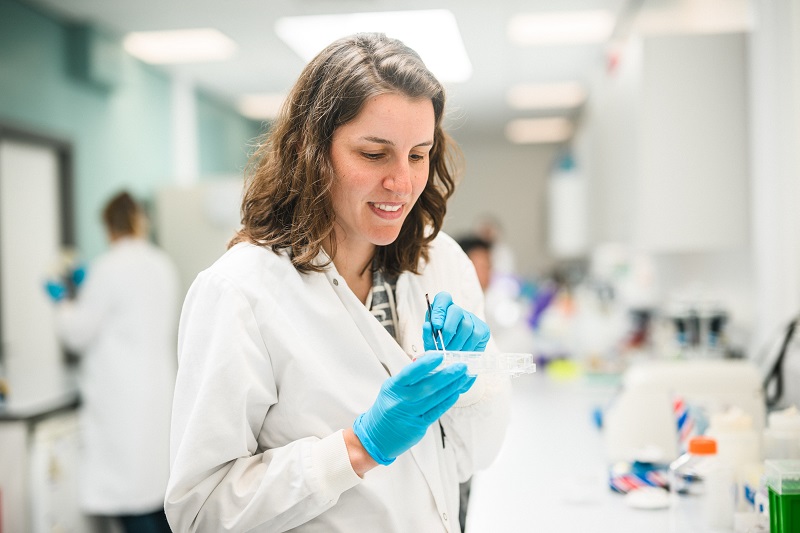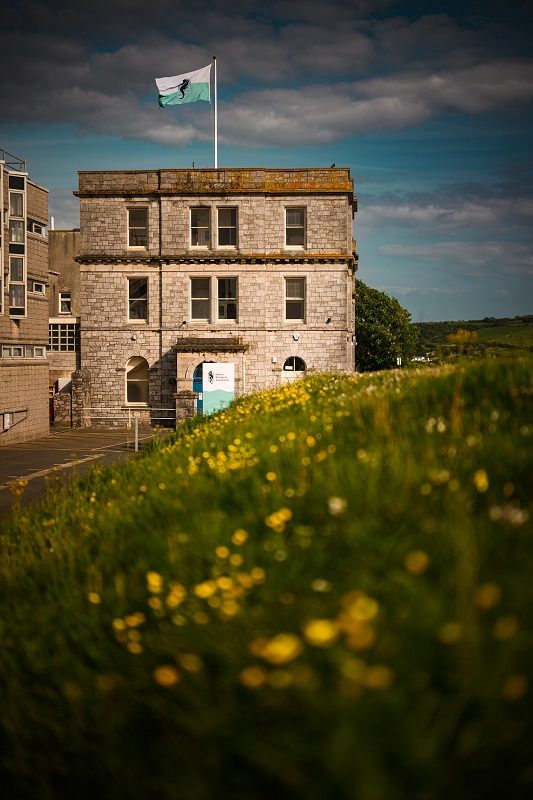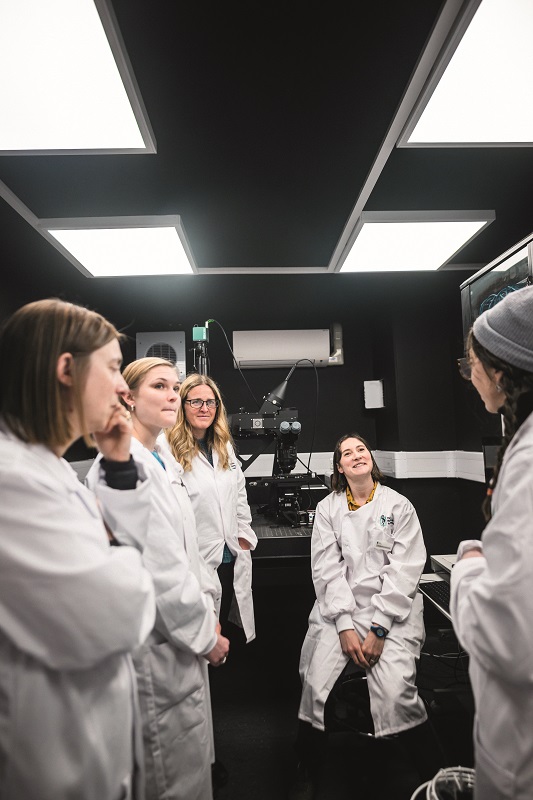The new marine microbiome centre of excellence
The Western English Channel is on the boundary between colder northern ‘Boreal’ waters and warmer ‘Lusitanian’ waters to the south. A fortunate historical legacy is that long-term zooplankton monitoring started at the MBA in the 1920s and a programme of long-term monitoring of intertidal organisms was established in the 1950s. Prof. Wilson said, ‘The Western English Channel is probably one of the best observed and monitored patches of water on the planet and supplies relatively pristine water. Our aim is to build on a substantial foundation of data from well over a century of sampling to build genomic and biomolecular observatories.’

The marine microbiome
It is amongst the diverse and teeming microbial component that almost all the biology in the ocean takes place, making it critical for the functioning of ocean ecosystems. The marine microbiome in the wider sense includes the viruses, bacteria, archaea, fungi, phytoplankton, and zooplankton. The MBA’s new Marine Microbiome Centre of Excellence (MMCE) has been established to help further our understanding of these marine microbes: how they interact, and how they contribute to the overall health of the system. MBA Chief Executive
Professor Willie said, ‘As an academic community, we’ve been doing marine microbiome research for over 30 years. The concept of all biology being interconnected via microbial processes—the research, the technology, and the methodology—has its origins in the marine environment.’
The marine microbiome makes up over two-thirds of the total marine biomass, sustains most of the ocean’s major biogeochemical cycles—including those that regulate the climate—and underpins marine food webs. In 2011, Mora et al. predicted the existence of perhaps 2.2 million marine species (242,663 are currently known ). This diversity contains billions of genes with the ability to express an inconceivable number of proteins and other molecules, and therefore represents a significant unexploited technological resource. Furthermore, MBA research is revealing that planktonic fungi are ubiquitous and play a vital role in the ocean. This unexplored genetic reservoir could potentially be a source of new antibiotics or antimicrobials.
Yet, despite the importance of the marine microbiome, we know very little about it. We need detailed ‘baseline’ information to measure how the microbiome might respond to global change, identify tipping points, and determine impacts on ecosystem services. Critical to achieving this are tools for biomolecular observing: diagnostic molecular tools, high-throughput screening, omics technologies, and bioinformatics to understand the molecular mechanisms that underpin the genetic complexity of microbial communities.
Given the huge quantities of carbon processed by the marine microbiome, understanding how climate change will affect microbial ecology is critical. This is a focus of strategic global initiatives, and much research centres on establishing a baseline in order to measure the impacts of a warming world. Microbes have the ability to react and adapt to warmer waters over short timescales (days to weeks), potentially mitigating the impacts of climate change. However, adaptation may result in a higher proportion of more pathogenic species that can be harmful to marine life and, ultimately, humans. Further research to understand, and even predict, the consequences of interactions within the marine microbiome will help us to manage the impacts of climate change.
Location, location, location
Like Hodgkin and Huxley, today’s scientists need access to fresh marine organisms and laboratories equipped with cutting-edge facilities. The MMCE has access to the clean seawater of the Western English Channel collected by the MBA’s research vessel Sepia. Also on site are specialized facilities including seawater aquaria, cell and molecular laboratories, and an advanced microscopy suite. The presence of established world-class research groups studying the marine microbiome is clearly a further advantage. Having all these facilities in one place will revolutionize the way microbiome research is conducted.

Coastal autonomy and partnerships
Opened in 2022 by HRH The Princess Royal, Plymouth’s National Centre for Coastal Autonomy is an integrated network for coastal observing and monitoring. The Marine Biological Association, Plymouth Marine Laboratory (PML), and the University of Plymouth, working together as Marine Research Plymouth (MRP), founded the Centre and developed much of the technology and infrastructure for autonomous sampling. The MBA leads the MRP initiative WCO-BON (the Western Channel Observatory, Biomolecular Observer Network), which will deploy autonomous vehicles supported by Smart Sound Plymouth (a 1,000 km2 region of the sea off Plymouth with a 5G network). One of the key goals for the MBA is an autonomous molecular sampling system, in which autonomous vehicles and supporting data infrastructure will enable real-time, genomic sampling of large swathes of English Channel waters. Within the next decade, the MBA plans to put in place a system of biodiversity forecasting.
Achieving biodiversity forecasting at a global level will involve an ‘ecosystem’ of partnerships. The WCO-BON is a UK exemplar in this hierarchy with the MMCE at its heart, and is part of Ocean Futures, a regional initiative that leverages the resources of the maritime industry to help develop the technology and produce autonomous vehicles. Nationally, the National Oceanography Centre (NOC), the Scottish Association of Marine Science (SAMS) and a number of universities are also working with a range of autonomous systems. The WCO-BON is a UN Ocean Decade endorsed Project aligned to the global Ocean Decade endorsed Programme, the Ocean Biomolecular Observing Network (OBON).

People first
To draw in the best people, an organization has to be one where individuals aspire to work. The MBA already hosts excellent research, and the completion of the MMCE puts in place the world-class facilities that will allow it to expand and push standards even higher. The new space will host at least three new research groups and the enlarged research community will further develop the inclusive, collegiate culture in which the MBA excels.
The MMCE will open up new opportunities for members of the MBA. We are developing a bursary programme to assist early career scientists, advance particular aspects of marine biology, and support visiting researchers to work at the laboratory. The MBA is also opening up a new category of institutional membership. The expanded science programme, together with new facilities, will present a varied range of opportunities for collaborations and sharing facilities, enhancing the offer for other marine science centres and laboratories.
The Centre will also give us greater capacity to expand and diversify our training and events programmes; for example, the national training centre for biomolecular techniques is a unique offering that will build on the work of the WCO-BON.
In a competitive climate, the new Centre is a regional asset that will attract the brightest students. The large research team, an inclusive culture, and new facilities make the perfect environment for postgraduate students. The MBA is involved with six different Doctoral Training Partnerships (DTPs), and a Plymouth-based Centre for Doctoral Training (CDT). The Centre will enhance the MBA’s already excellent reputation for training the next generation of scientists. The national and international networks that develop as alumni advance in their careers will be further valuable assets for the MBA.
A spirit of exploration
Sixty years on from the days of Hodgkin and Huxley, people’s clothes and the cars in the MBA’s car park may have changed, but those scientists would still recognize the spirit of exploration that personifies the MBA. In this latest cycle of its regeneration, the MBA hopes to attract the best minds from across society to join it on its journey and, who knows, perhaps add another Nobel Prize to its achievements.
• Professor Willie Wilson FMBA, MBA Chief Executive
• Guy Baker Mem.MBA
The new facilities were made possible thanks to a £1.35 million grant from the Wolfson Foundation and a grant of £400,000 from the Garfield Weston Foundation.
Further reading
Mora, C., Tittensor, D.P., Adl, S., Simpson, A.G., & Worm, B. 2011. How many species are there on Earth and in the ocean? PLoS Biol. 9(8):e1001127. doi: 10.1371/journal.pbio.1001127
1 The Nobel Prize in Physiology or Medicine 1963 was awarded jointly to Sir John Carew Eccles, Alan Lloyd Hodgkin and Andrew Fielding Huxley. See: Sims, D. 2014. Inside the squid giant axon. The Marine Biologist, 3, 28.
